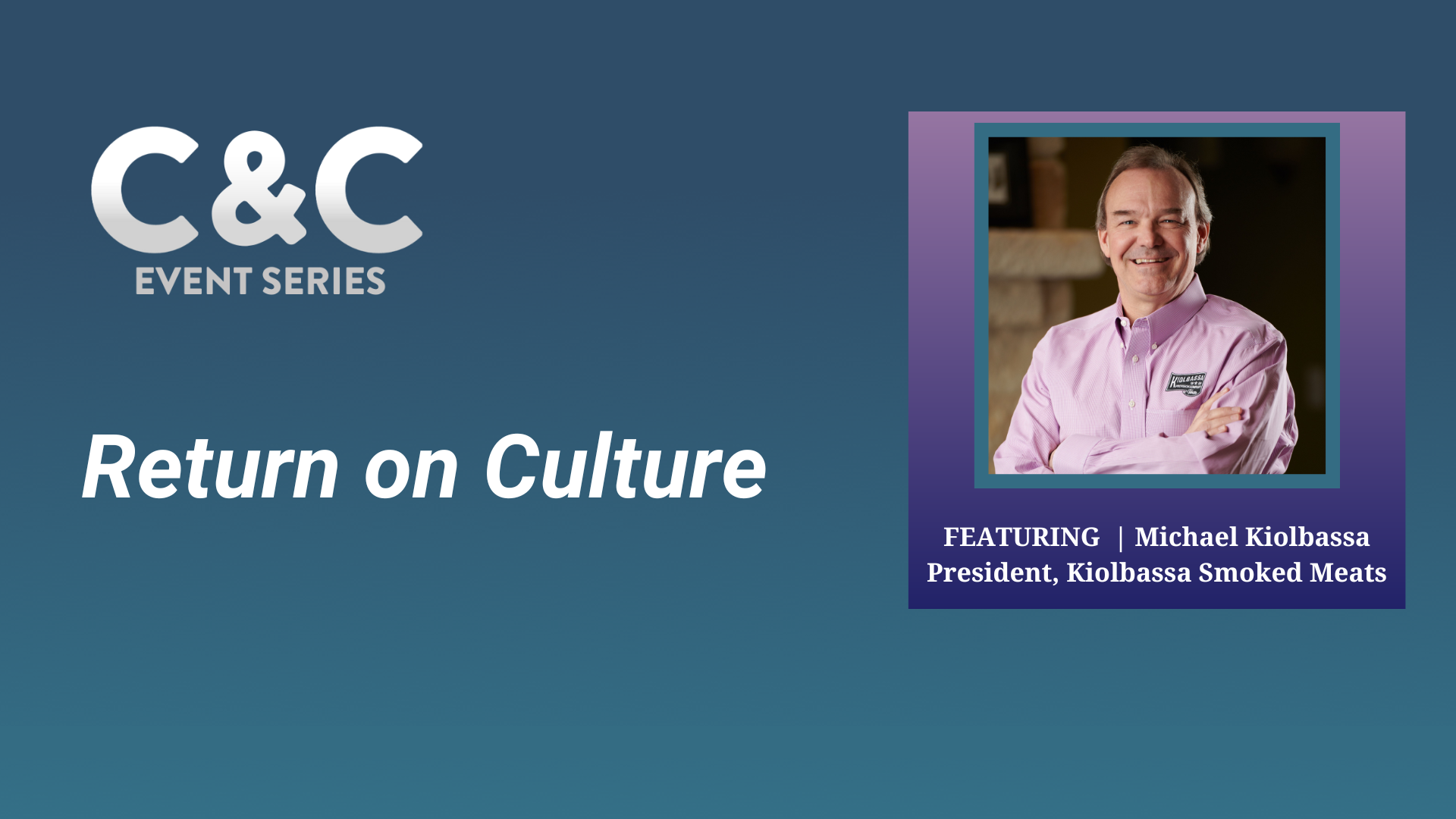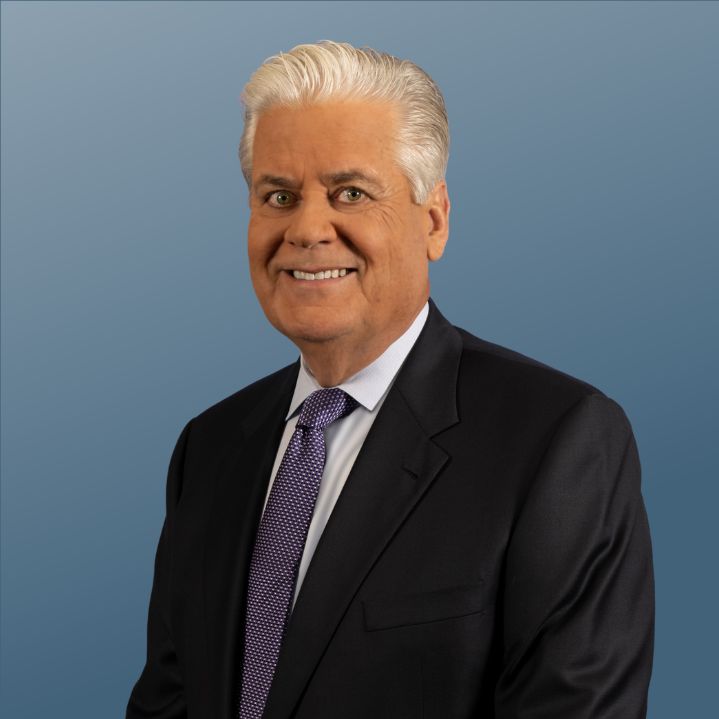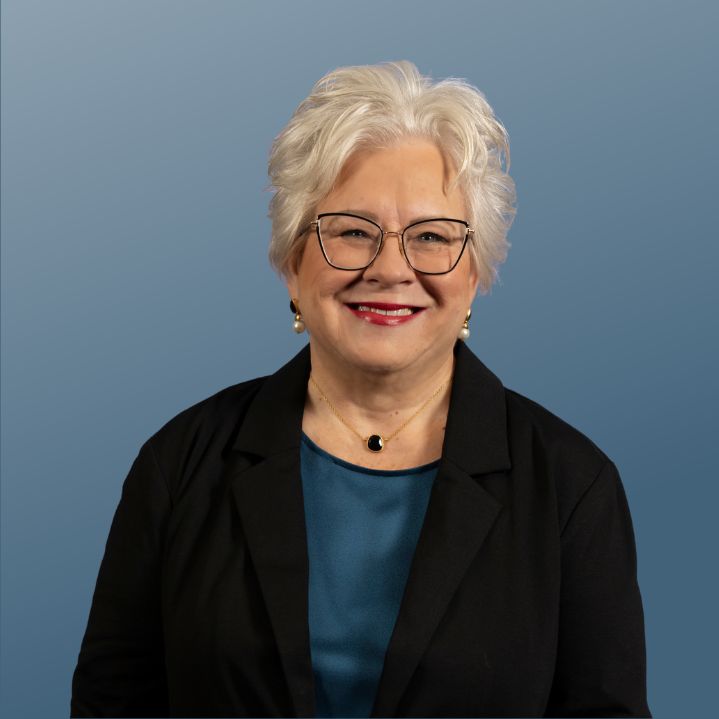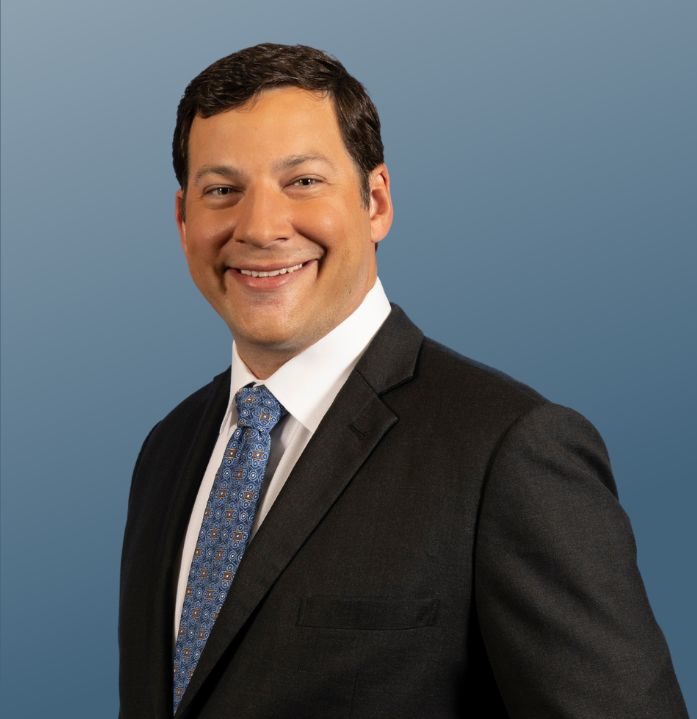Wednesday, February 1, 2023
Noon – 1:00 p.m. CST
Zoom Virtual Meeting Room
This presentation details how building a values-based and open-book culture transformed the Kiolbassa Smoked Meats company and team. Watch the presentation by clicking the play button above.
C&C Event “Return on Culture” with Michael Kiolbassa
Jan 2023
Todd: Good afternoon. I’m Todd Healy, on behalf of my partners at C3, I’d like to welcome you to our 23rd C&C Event. We’ve provided our C&C Events for several years. The objective is to bring you a speaker and a topic that you may not be exposed to somewhere else. We’d like to thank Jose Ibarra, our good friend in Mexico City, this is his 23rd C&C Event! Jose, thank you for being such a reliable participant.
I’d like to review the support logistics. Please write any questions in the Zoom Q&A. Depending on Michael Kiolbassa’s time, we’ll address at the end of the presentation. We have good news and bad news about Michael. The good news is he is here with us. The bad news is he had a last minute trip scheduled to Washington DC. Rumor has it that Michael is in DC seeing how law is made. [Laughter] So with that Rowe, I’ll turn it over to you.
Rowe: Thanks so much, Todd. When we talk about employment, an employee that is working a nine to five desk job has a very different experience than that of a pilot. But when you talk to them about management in their companies, they very well could have very similar experiences. Conversely, you could have two people working the same job under two different managers. One thinks it is a dream job, the other thinks it’s a nightmare. I bring this up because it comes down to business culture. When you have a culture that is very much present in the life of your business, and aligned across all boards, your motivation and your success is driven forward. When you are a company that does not have a strong culture, you’re like a ship without a rudder.
Today, we have Michael Kielbasa of the Kiolbassa Smoked Meats company. Michael has experienced a lot of cultural issues at Kiolbassa Smoked Meats. Michael is the current CEO and Chairman of the Board. He was the President for many years, and he has been an integral part of the company’s cultural change and the massive growth over the past 15 years. Since 2015, Kiolbassa Smoked Meats has been recognized as the top workplace every single year by San Antonio Express News. We’re so glad to have him here today. Michael, thank you so much for joining us.
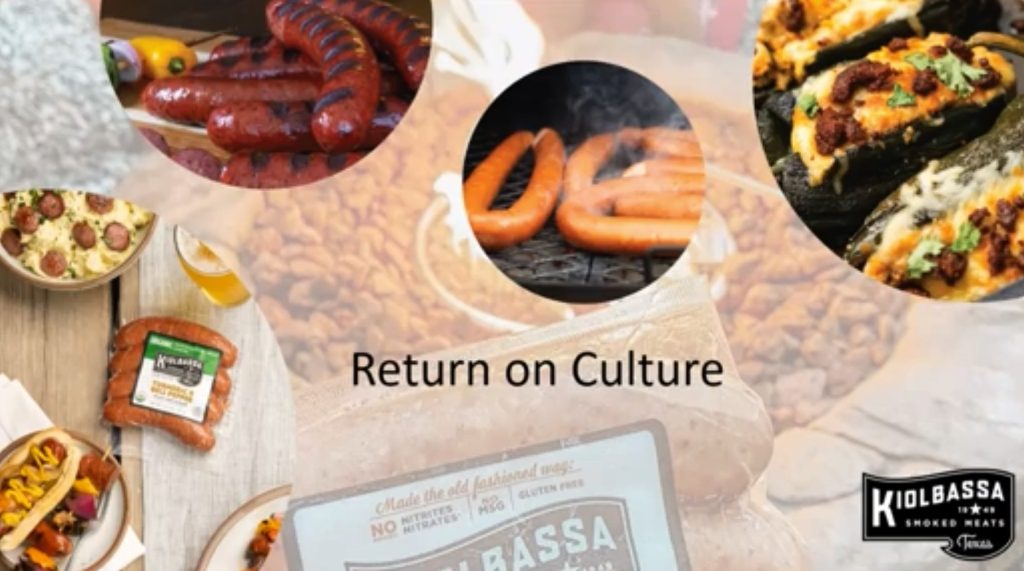
Michael:
Thank you Rowe. I also want to thank Todd, the whole C3 Financial team for inviting me to speak today. It is a true honor to tell a little bit about my journey. I want to thank all of the attendees for taking time to listen to the sausage guy tell his story. I appreciate it very much. I am honored and humbled to be here.
I’m going to start with some topics for the audience to consider. How many of you in this have been ready to surrender? How many of you have had a point where you asked, is this really what I want? Could there be a better way?
It was the summer of 2009 and I was there. I was on the verge of burnout. I felt isolated, tired and frustrated. Early one morning I was having my daily conversation with God and I made a decision. A decision that changed not only my life but the lives of a lot of people around me and my company.
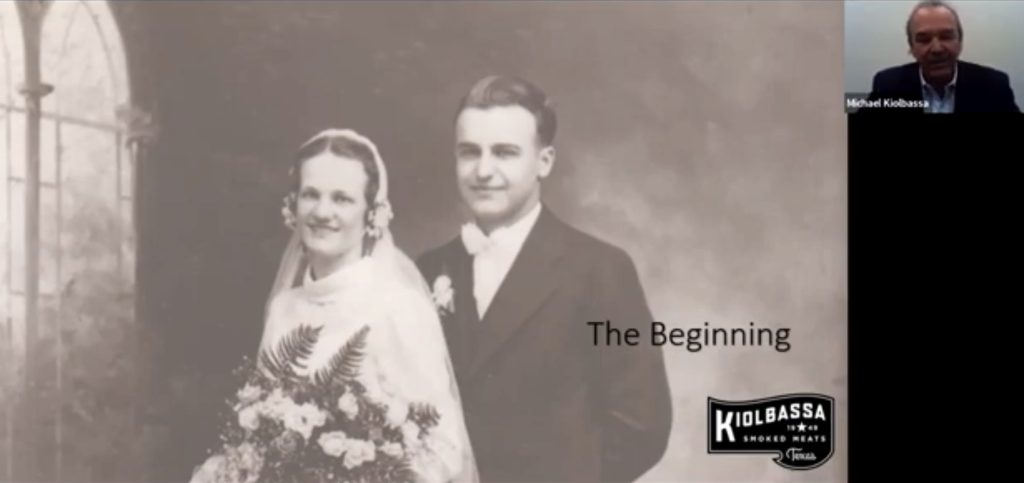
My story starts with these folks in this slide. My grandparents, Juanita and Rufus Kiolbasa. I never met my grandfather as he died before I was born. In 1949, my grandfather and my grandmother started Kiolbassa Provision Company. My grandfather passed away of a brain tumor in 1960. My father had left college a couple years earlier to help when he got sick and took over the business. My dad did a great job. He expanded the business into hog and cattle slaughtering and steadily grew the business by adding many new products. Again, he did a great job. When I graduated from Southern Methodist University (SMU) in 1987, I fully expected to work for the family company. However, my dad said, “Not so fast. Why don’t you work somewhere else for a while, and then give me a call if this is something you really want to do.” My degree was in finance. I got a job as a credit analyst at a bank in San Antonio. After a couple years, I called my dad and said, “Dad, I’d really like for you to give me a shot.” He acquiesced. In the spring of 1987, I joined the family business. You can see a picture of my dad and me on this next slide.
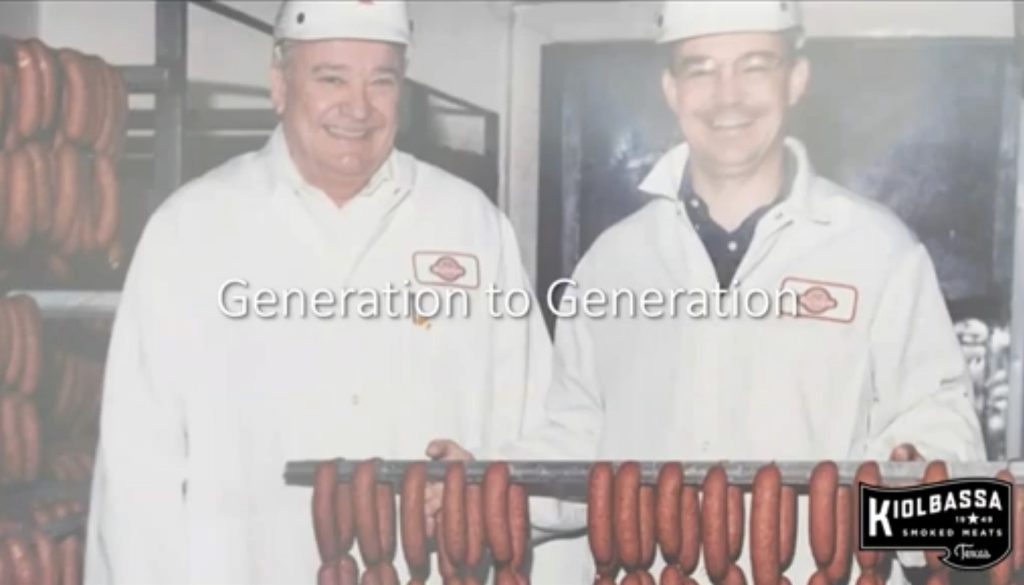
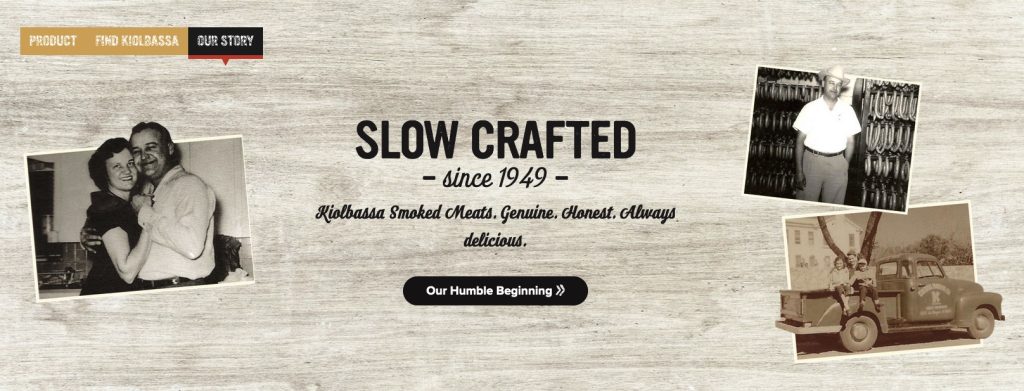 Rowe:
Rowe:
When you joined the company, Michael, what was the business like, then? Was there anything that you immediately noticed and thought could change? Or maybe it should change? What was the culture at that time?
Michael:
Great question Rowe. In 1987, we were primarily a hog and cattle slaughter company making up about 90% of our revenue. I knew that with my background in banking, that if we were going to grow, we needed to focus on the sausage side of the business, and de-emphasize the commodity side. I started to pivot the company’s focus away from the slaughtering side and into building the sausage brand. Keep in mind, in 1987, we did not sell our product to any mainstream grocery stores. We sold to little mom and pop meat markets, mainly on the south and the east and the west side of San Antonio. We invested in a little marketing – and that’s another story for later. But we invested in marketing and the brand grew steadily. In 2003, we exited the slaughtering business and expanded our sausage capacity. In 2005, we started making a private label product for HEB. This is still the only private label product we make. It really helped bring me to the dance, so to speak. We did a great job of executing my strategy of getting away from the slaughtering business and focusing and building the sausage brand. In fact, by 2009, we had taken the sausage business from less than a million dollars in sales to about 20 million in sales.
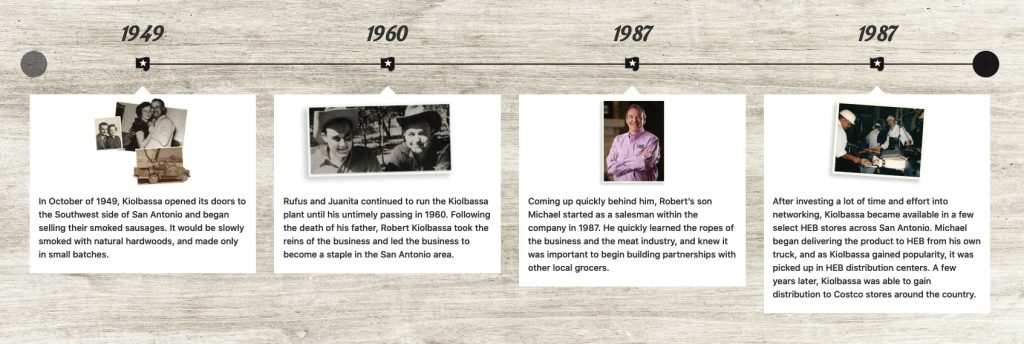
Rowe:
That is pretty incredible growth. I’m sure it’s due, in a large part, to being a graduate of the Cox School of Business at SMU. I hear about the programs in the finance world you can go through. I also hear the graduates tend to be very handsome! [laughing]
Michael:
[laughing] Absolutely!
Rowe:
Why don’t you talk a little bit about how you got into HEB. That seems like it was a pivotal shift in the growth of the company.
Michael:
Yes, that’s a great story. In 1989, I found a little sausage packaging machine in the corner of one of our coolers.

I started selling to a few mainstream grocery stores. Handy Andy was one of the big stores back in the late 1980s. Next, I found five HEB’s that would sell our product. I would go on the weekends and hand out samples. People would tell me, “Michael, this is the best sausage I have ever eaten!” I would sell a ton of sausage on the weekend. I went to HEB buyer, David Lusk. David was a great guy. Unfortunately, he’s passed away, but he was a wonderful man. And I said, “David, here’s my sales. Can I get more stores?” And he said, “You know, Michael, you’re doing a great job. But I’m over-skewed on sausage. Just keep doing what you’re doing and come back in six months.” I was disappointed. But I kept handing out samples on the weekends and selling lots of sausage. People kept telling me it was great, the best sausage they’ve ever eaten.
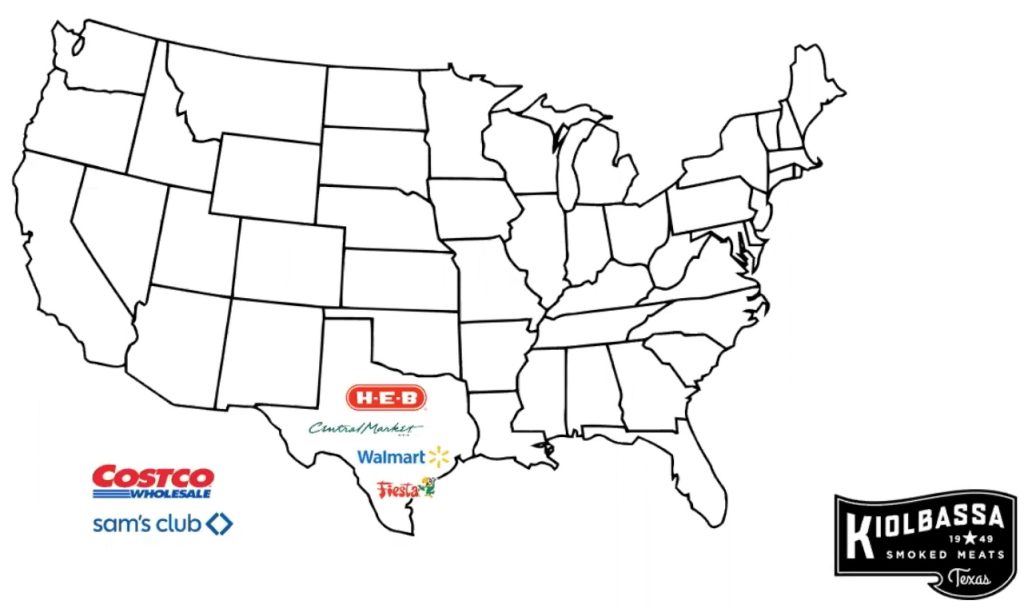
I went back in six months, and I asked for some more stores again. David gave me the same answer. He said, “I’ve just got too many sausage brands already. I’m sorry, Michael. I just can’t add any more.” Well, I got a little upset, of course not at David, just frustrated internally. I decided that I was going to do something about it. I called a guy named Carl Wigglesworth, who had a radio talk show in San Antonio on KAHL in the afternoons. Some of y’all may remember Carl Wigglesworth.

I said, Carl, this is what I do, this is who I am. I’d like to invite you to tour our plant. You can meet Eli, our sausage maker, meet dad, and everybody. We want to see if this is something you can sell on your radio show . He said, “Sure, Michael.” He came down and toured our tiny little plant. I gave him some sausage. Carl called me the next day and said, “Man, Michael, this is great. I can sell this.” I said, “Okay, here’s the deal, Carl, I can only afford to buy three radio spots a week on your show. I want to buy one on Thursday and two on Friday, because that’s when people do their weekend shopping. And I said, “Carl, you can talk about the family, you can talk about the small batch, you can talk about Eli, you can talk about whatever you want to talk about. But there are two things that I want you to hammer home on the radio. The first, is if it’s not the best sausage you’ve ever eaten, call Michael, he’ll give your money back. The second thing is, if they can hear your voice Carl, they can find it at their local grocery store.” Which was a bald face lie. I mean, it was just a bolt of lies. My dad wanted to fire me. He said, “Michael, we might go broke refunding everyone’s money for the sausage. There is a lot of good sausage made in central South Texas. He said we’re gonna make our biggest customer opportunity mad. And I said, “Dad, don’t worry about it. Trust me, we got to do something.” And so sure enough, Carl started running the ads. A couple of weeks later, I got a call from David at HEB. He said, “You know, Michael, I don’t know what’s going on, but I’m getting calls for your product. I’m gonna give you 10 stores. Can you handle them?” I said, “Sure I can.” Keep in mind, we only had one little tiny packaging machine. Two weeks later, he called me back and he said, “Hey, I don’t know what’s going on. But I’m getting a bunch of calls. Can you handle all 35 stores in San Antonio?” And I said, “Sure I can.” A month later, he called me and said, “Man, I’m getting calls from Corpus Christie, Kerrville and Austin, I’m just going to authorize you for the whole company. Can you handle it?” And I said, “Sure I can.” Needless to say, I worked that little packaging machine to death, but wow, it was a successful campaign and in the rest is history. That’s how I got my start with HEB.
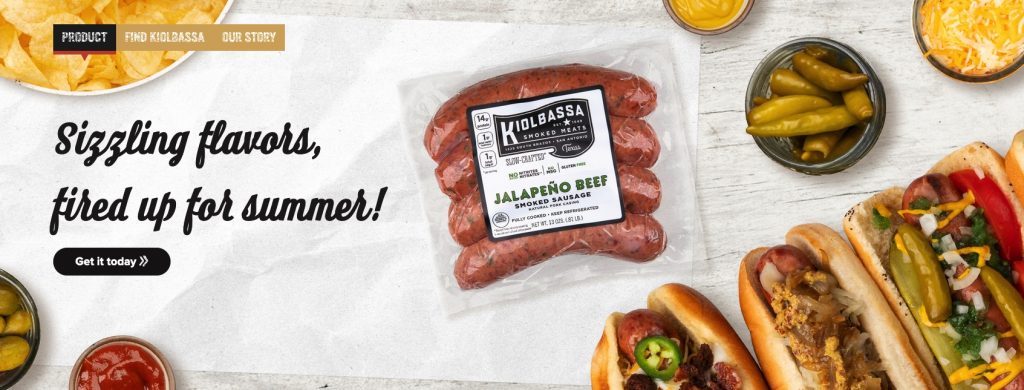
Rowe:
That’s pretty amazing. So between that point in time, and around 2009, you said you basically took the business from around a million dollars a year to $20 million a year. Is that correct?
Michael:
That’s right.
Rowe:
Yeah. Wow. That’s obviously very successful. But I know that things have changed since then. What was the culture like towards the end of that period? Where did you start to have thoughts about making changes?
Michael:
You know, a typical family business is a top-down management style. My father was a great leader, but he was very top-down. People would come to him if there was a problem. I just adopted that management style. That’s just what you do, follow your father and follow his style.
This is really where my story starts. In 2009 the company had grown from a million dollars to 20 million in sales. I was on the verge of burnout, I was really frustrated. One morning, I was on vacation with my wife in Mexico. I was looking over the Pacific Ocean, and had a conversation with God. I said, “God I’ve done it my way, for 22 years, I think I’m gonna give you a shot at it now.” And that’s really what I said. It was a moment of surrender. It was completely unplanned, unexpected. I was unsure what I was, or what I was doing. But, I will say my prayer life went from praying and hoping that God listened to me to praying and trusting Him. It was an opportunity to take a step back and start to listen. I opened myself to new ideas. That’s exactly what I did.
Not too long after that, I was hosting a YPO retreat for our chapter at Port Aransas. I brought in a facilitator, Jim Warner.

At the end of our retreat, Jim said we had one final exercise to go through. He asked us all to name an unconscious commitment that we had. I looked at Jim and I said, “Jim, that’s pure psycho-babble. I’m perfectly conscious of every commitment I have.” And he looked right back at me, he didn’t even skip a beat. He said, “Michael, I’ve only known you for two days. But I can tell you are full of unconscious commitments.” I thought, wow, okay. Well, let me think about it for a moment. I said, “Okay, Jim, if I’ve got one unconscious commitment: I’ve got to have my finger in every part of our business.” He said, “Great, write that down.” Then he asked me, “How do you do your unconscious commitment? I said, “Well, I’m the sales guy. I’m the procurement guy. If there’s a problem with production, they ask me what to do. I ‘m an HR guy.” He said, “Great. Write that down.”
Next, he asked me, “How does that unconscious commitment serve you?” How does it serve me? I said, “Well, makes me feel like I’m doing my job. It makes me feel like I’m important. It makes me feel like I’m in control. He said, “Great, write all that down.” Then asked me, “What’s at risk if you change?” I said, “Loss of income. Because people make mistakes, and it hits my income, not theirs. Loss of power. And if I’m completely honest, probably loss of ego.” And he said, “Great, write that down.” And so I did. Next he asked me, “Is it working for you?” And I said, “No, it’s not. Our top line has grown. But our bottom line is not. I’m frustrated. I know I’m not as good a leader as I could be. I know this is spilling over into my family life. I’m not as good of a father or a husband as I’d like to be.” He said, “Great, write that down.” So I did. And by the way, to remind me, I keep a little notepad where I wrote all this stuff down. I have it with me every day in my backpack. Then he asked me a question. He said, “Are you willing to change?” And I said, “Yes, I am.” So he sat down with me and we took a few minutes while he walked me through writing what he calls a clean commitment statement. It is essentially working on the business rather than in the business.
I went to the plant the next day and walked into our VP of productions office. His name’s Ishmael. I said, “Ishmael, from now on, I don’t have anything to do with production. If you guys need me, come get me. Otherwise you handle it. He looked right back at me, didn’t skip a beat, and said, “Michael, it’s about time.” Wow, if I ever needed validation, there it was.
Slowly I offloaded most of the things that I’d been doing. For example, I used to follow the staff to look at the meat. I went to Stacy who has her master’s degree from Texas A&M and was eminently smarter than I am about meat. I asked her, “Would you like to do this, Stacy? I’ll show you the process.” She said, “Oh yes, I’d love to.” I did that with most of the items, I couldn’t do with all of them, but I did it with most of them.
That allowed me to be able to step back a little bit. With the extra time I started taking guys from the floor to lunch, just to get to know them a little bit better. I wanted to find out about their personal life, but they wanted to talk to me about business. The reason they wanted to talk to me about businesses is that they did not like the culture at all. They said, Michael, “We love working for you, but we hate our boss.” I learned right then that we had a big problem in our company that we needed to deal with. I changed my focus completely. What I’ve learned over those 22 years is we’d take people who are great machine operators, and put them in leadership positions without giving them any leadership training. I mean, it was not very smart. But that’s what we did. That’s why we had so much dysfunction on the floor. That’s why we were making mistakes. I went to my HR director and I said, Rosalynn, “We need to bring in a leadership development program.” That’s when we stumbled on Values-Based Leadership, which is a leadership model that Ken Blanchard developed in the 1980s. Fortunately for us, HOLT is in San Antonio, and were an early adopter of Values-Based Leadership. The company formed a subsidiary that helps companies institute Values-Based Leadership.

I reached out to a guy named Guy Clinton, one of the most fantastic men I’ve ever met in my life, who was president of hope. And I said, “Guy, can you put me in touch with somebody that has successfully implemented Values-Based Leadership, so I have an idea of what to expect? He said, “Sure.” He put me in touch with a guy named Charlie Luck. He’s the third generation of his family to run a stone quarry operation in the mid-Atlantic called the Luck Companies. I called Charlie up. He is a YPO, so we talked a little bit about it. Then I said, “Hey, tell me a little bit about Values-Based Leadership.” For the next 30 minutes, that’s not an exaggeration, for the next 30 minutes, he basically grilled me on how tough I was, and how committed I was to Values-Based Leadership. Finally, I stopped and I said, Charlie, “What’s the deal? I just kind of want to find out where the landmines are.” And he said, “Michael, if you decide to implement Values-Based Leadership into your company, it will be the hardest thing you ever do.” And I asked, “Why?” He said, “Because Values-Based Leadership isn’t about fixing others. It’s about fixing yourself.” I said, “Oh, okay. All right.” He said, “Look, if you’ll, invest the cost of a plane ticket to Richmond you can see what this looks like in person.” I did and I spent the day with him and his team. I came back fully committed to instituting Values-Based Leadership in our company after that meeting.
Rowe:
This is really interesting to me. Do you believe that culture was going back to your dad’s leadership style of top-down management? Was that the culture percolating throughout Kiolbassa?
Michael: Yes, absolutely. No doubt about it. People were paralyzed to make decisions, they were afraid that they were gonna get hollered at if they made the wrong decision, or if their decision didn’t didn’t pan out. That’s why they always came to me or my dad and said, “Hey, what do you want? What do you think we should do?” Well, hell, we were not the people closest to the axis. Most of the time, we made a suboptimal decision. We didn’t have all the facts, we weren’t actually working on the line.
The first step in Values-Based Leadership is to identify your values. It is basically a recipe, where a vision is identified. I call it my purpose. Then identify the mission and core values. On the next slide, you’ll see what we created.
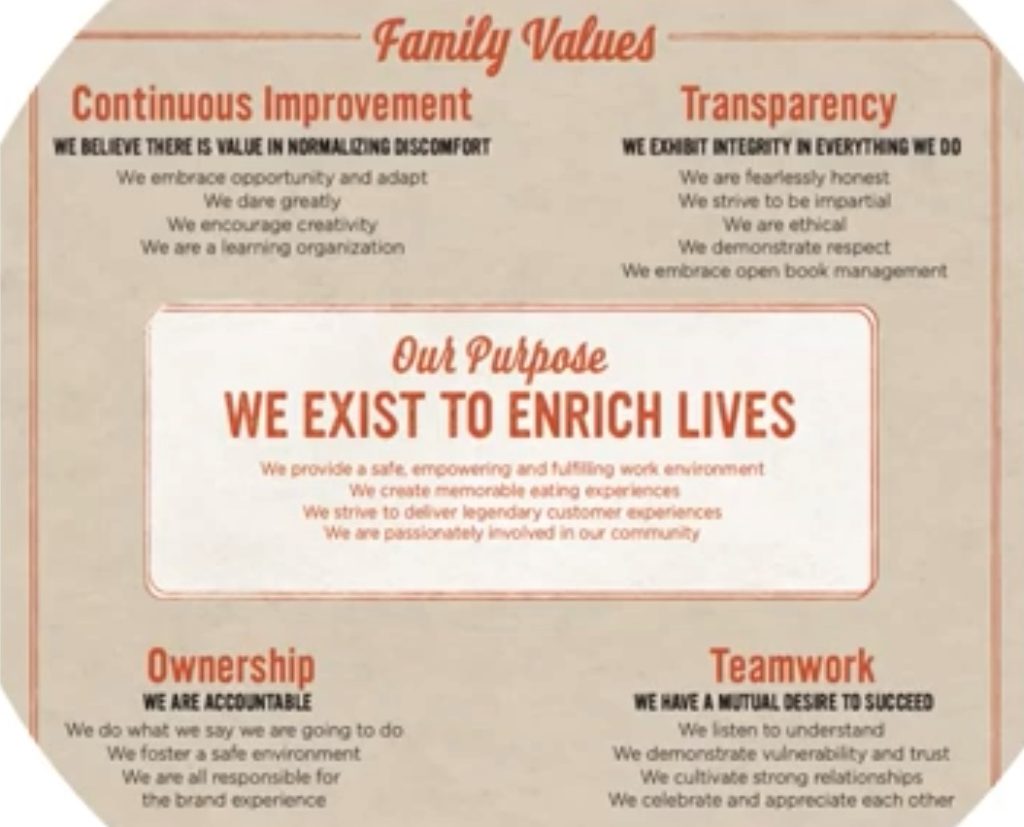
It took about six months to develop and we have refined it over the years. The reason it took six months is because I didn’t want this coming from me, my family, or even the senior staff. I wanted it coming from the people on the floor. We put focus groups together. We asked our team, “Why do we exist? What is our purpose?” What we came up with is: “We exist to enrich lives.” Then we asked, how does that work in our business? We created bullet points:
- by providing a safe environment
- by creating legendary eating experiences, etc.
Next we asked ourselves, what do we do? Our mission is: “To craft authentic sausage and food products.” We are even more narrow than that. It’s really sausage. Then we asked ourselves, how are we going to do it? That’s where values come in. The purpose, the why, is our vision, what is our mission, and what are our core values. Again, the reason it took six months is because we identified these, and then we wanted to put some bullet points underneath each one. The reason is that we wanted to hold ourselves accountable to these values. This created enormous clarity in our organization about what is important. We put this poster in every office, we put it up in every processing area of our business, it is in English and in Spanish. I told people, “Look, this is all you really need to know, this is our Bible. If you make a $100,000 mistake, and if you’re in alignment with this, you’re safe. If you make a $100 mistake and if you are not aligned with this, then you are out of here. Again, enormous clarity in our organization.
The other thing we did is we started teaching the five Values-Based Leadership tools. We used DISC, which is a personality profile, to improve communication, situational leadership, conflict resolution, principles of persuasion, and influencing. We taught this to everyone in our organization. We taught it in English and Spanish. For most people in our organization, it was the first time any employer had ever invested in any kind of training with them. They soaked it up. They were total sponges.
The other thing we started doing is we changed the way we did our business. For instance, the way we hired employees. We used to hire based only on technical skills. Hey, we needed a welder, we got to find a welder. Now, after instituting Values-Based Leadership, we started hiring based on values alignment first. We asked ourselves, is this person aligned with our values? Are they adaptable? What is their learning attitude? Are they a learner? Do they have a learner mindset? Only then, after that criteria was met, we would hire based on their technical skills. It was a complete change on how we did business.
We even started asking ourselves about our customers and vendors. Do they align with our values? And some didn’t! We asked ourselves hard questions. Do we want to continue doing business with them? Some of them we didn’t and we had some conversations with them. If we didn’t feel good about it, we left them.
It also changed the way I showed up every day. We began making a conscious effort to build trust in the organization. We did that primarily by being vulnerable with each other, especially me. I started listening more, and talking less, asking for feedback. Now I am making a ‘people list’ rather than a ‘to-do list.’ We created a culturally safe environment where people felt empowered to take risks. Fail fast, lean into discomfort. It was the perfect timing for us. Because as we were getting our environment set, we were getting ready to go on a pretty wild rocket ride of growth. At the same time we were doing this, I brought in a new sales guy to take off the last job that I had, sales. I brought Chuck Harris from Tyson Foods. Chuck had grown up in Seguin, his family was part of Holly Farms. If any of y’all remember Holly Farms Chicken, Chuck’s grandfather started it. I brought in Chuck to help take our sales to the next level. Boy did he! Almost immediately, we started growing 25% a year!
From the outside, we look like this smokin’ hot Ferrari driving down the road.

But this is how we felt on the inside! [laughter]
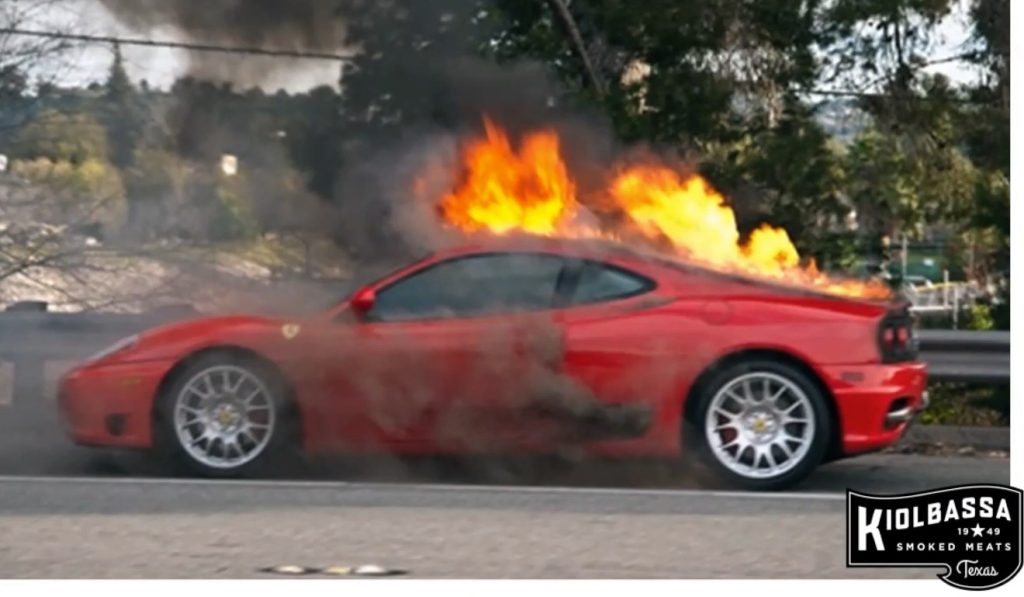
We didn’t have any of the systems or processes ready to handle that kind of growth. And we were broken. We really needed help. I reached out to a guy that I’d never met before. He’s an author of a book called Mastering the Rockefeller Habits and Scaling Up, by Vern Harnish. I emailed Vern and said, “Vern, this is who I am, this is what I do. I’ve got this rocket ship, and I need help.
To get granular here, there were two conversations going on in our business at this time. One was, coming from my senior team, “Hey, Michael, we need to start thinking about building another plant to keep up with our growth.” The conversation in my head was, “Hey, we need to start building cash.” We were burning through all our cash with increased inventories, higher receivables, inefficiencies. Vern got right back to me – in 10 minutes. He said, “You need to buy a book called The Great Game of Business by Jack Stack. I want you to read it and I want you to go visit Jack in Springfield, Missouri.”
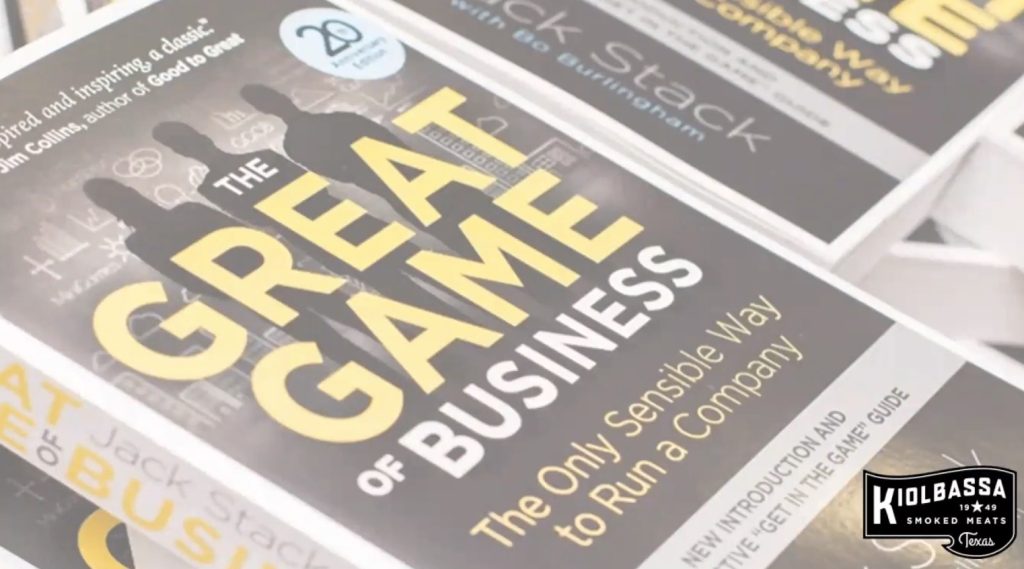
I read the book over a weekend and called them. They were actually having what they call their “Annual Gathering of Games,” which is a practitioner’s conference just a couple of weeks later. So I grabbed this young guy named Michael Johnson. Michael is the complete opposite of me in our organization from a DISC profile. I’m a high I and a secondary D and he’s high C and secondary S. I knew that if I brought him with me, and we both thought it was a good idea to implement this, then we would. I call him MJ. So MJ and I went to Springfield and we listened to the people during the day. Then we’d grab a beer at night and share our thoughts. We both came to the same conclusion: the Great Game of Business was to open up books and create financial transparency to our teams. Then they can create a line of cipher, how their work affects the bottom line. This aligned so much with our core values, and our purpose to enrich lives, that if we didn’t bring it in, we would be violating our own core values. In October 2013, we opened up our books and brought The Great Game of Business into our system. I was scared to death, Rowe. I was scared to death because although our topline sales were strong, we had lost more money in the last two months than we had made in most years! I was afraid that all of the talent that I brought in over the last couple years was going to go hit the door and say, “Man, I’m jumping off this sinking ship.” I was afraid that the people who stayed were going to be so paralyzed for fear that they wouldn’t get anything done. But just the opposite happened! The vulnerability, the transparency, of opening up the books magnified the trust that was building in our organization. It unleashed creativity! Immediately people started talking about how to improve processes, how to improve yields, how to reduce waste, how to cut expenses.
The weight of the world lifted off my shoulders and onto theirs. I became more of a coach than a boss. I started teaching people how the company makes money and how we generate cash and
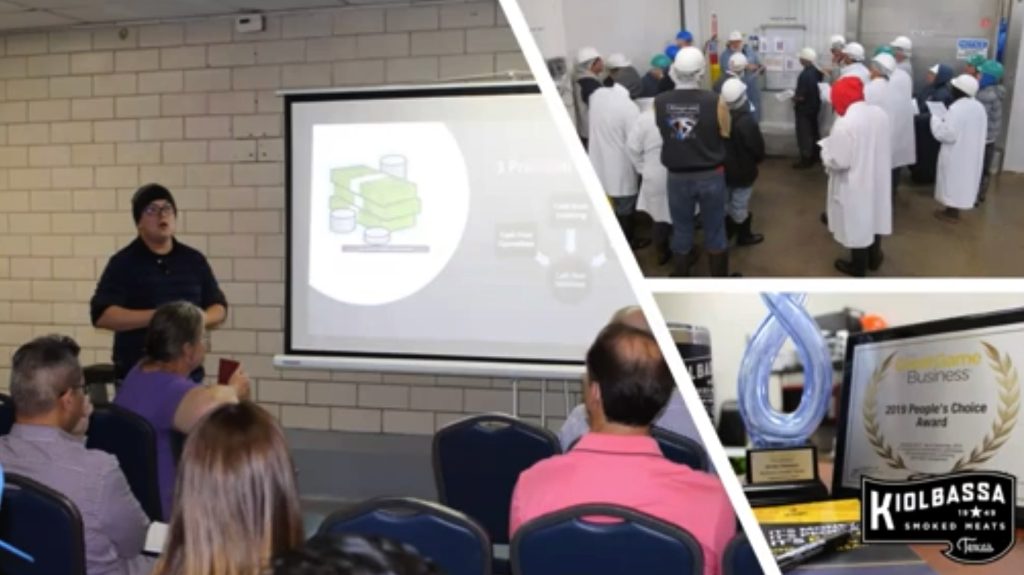
On this slide you’ll see the scoreboards we put up throughout our organization. Team members led the conversations about what our KPIS are and how we’re performing against our KPIS. It completely transformed our business and our culture. Quite frankly, it has transformed my life.
Todd mentioned we’ve been named the top San Antonio workplace seven or eight straight years. Our Top Line has grown six times as a company since we introduced Values-Based Leadership, Open Book Management and The Great Game of Business. Our bottom line is growing faster in our Top Line, which is nice. I’ve never been more fulfilled in my life. It’s truly an answered prayer.
The epilogue is that I got lost back there in 2009, I talked to God and told him that I was gonna give him a shot. I said, “Look God, if this works (which is kind of funny to say God) if this works I’m going to tell people about it. So that’s why I’m here today. That is why I said yes. [laughter]
Rowe:
Thank God for that Michael. We certainly appreciate it. It’s really interesting, I took a look into the Great Game of Business over the weekend and compared it with your company’s values. The overlap is quite incredible. You already have the family value of transparency and one of the most important aspects of the Great Game of Business is knowing and teaching the rules, knowing the critical numbers and opening the books. The other parallel with your core values, thinking about a small mom and pop family-run business. Your family values that you are using across your company, are the values that I would think a mom-and-pop shop would have. I think it’s so incredible that you’ve been able to expand that into a company the size of Kiolbassa Smoked Meats. I think a lot of it has to do with your messaging, such as having the values posted everywhere. And really getting every team member involved in every aspect of the business.
One thing I’d like to touch on, through the course of your journey you found team advisors. Jim Warner who inspired you to define your unconscious commitment. You had your eureka moment about the changes you needed to make. Then you ran into Ken Blanchard and Guy Clumper, Charlie Luck who introduced you to Values-Based Leadership. Next was Vern Harnish and Jack Stacking who led you to the Great Game of Business. Was there much of an ongoing conversation with those guys through the years? Did they become aware of each other or work with each other on your behalf?
Michael:
I know some of them knew of each other, but they’ve all been a big part of the journey. I still keep in touch with every one of them. Some more than others. But, Jim is still a very trusted advisor. He was the catalyst that asked me the question. So, he’s a very important part of my life. Guy Clumper is still my monthly coach. We use him as a facilitator for our strategy meetings. All these guys are a big part of my journey. It is hard to quantify the impact. Honestly, when I think about telling my story it is to pay this forward. Hopefully I am planting a seed in someone’s mind. Perhaps they think, “Maybe this could work for my company.” It’s really to encourage people to take this leap. I mean, opening up your books is not something that most private businesses do, especially family companies do. But I can just tell you from my experience it’s the smartest thing I ever did.
In fact, I’ll tell you a quick story. I mentioned in 2012 my dad had a minor stroke right as we were launching this. In 2013 when I decided to bring in open book management and the Great Game of Business, I didn’t ask my dad for permission. I was president of the company and I thought, this is what they pay me to do. I am paid to make these decisions. So I didn’t ask any of my family members who were owners. About three months after we had launched the open book management my dad came to the plant. I said, “Okay Dad I want to show you something.” I took him to the break room where we had our income statement on an entire wall and our three month forecast. That is the essence so you can make decisions to help impact the future. So as I was walking my dad down the hall and trying to explain to him what open book management and the Great Game of Business, I’m stumbling, fumbling and nervous as a tick. Being old school I just knew he was going to say, “You should keep all this stuff to yourself. You do not share your finances with your teams.” Anyway, I walked him into the room and I said, “Dad this is this we’re doing now. We are forecasting and I am trying to give the teams insights on how they can impact the numbers. My dad is a man of few words. He was just looking at that wall. I was thinking, this is not going to turn out well. [laughter] He finally opens up his mouth and he says, “You know Michael, I think this is the smartest thing you’ve ever done.” Oh wow, I breathed a sigh of relief! I don’t know if he believed it, or if he was just trying to give me some validation. But it was probably the most important validation I could have received. As someone that’s done it for 10 years, I can tell you it really is the smartest thing I’ve ever done.
Carolyn:
Michael that makes you curious about the other family members who are stakeholders. What was the process to bring them along with this vision?
Michael:
It’s a great question, Carolyn, I’ll be honest with you. I beg for forgiveness, rather than ask for permission. [laughter]
Rowe:
I can relate to that! [laughter]
Michael:
I did not know what the answer would be if I asked for permission. But I was so convinced that was the right thing for the company that I just went all in and trusted my gut. I used examples from the book as proof that this was a good idea and I just brought people along. I’m sure there were family members that thought I was crazy. And maybe they didn’t appreciate it. But it was a pretty easy process because the business was clean from a family perspective. It’s not like we had a family ranch that we were financing through the business, or lake or beach house. So it was pretty clean from that perspective.
Rowe:
I’m sure they’re happy now. I’d also like to ask you about the power of goal alignment and coordination among your internal team. You talked a little bit about Chuck Harris taking over sales, MJ and Stacy with meat procurement, and Ishmael with your production. Once you got into both the Values-Based Leadership and the Great Game of Business I suppose with all that transparency how much are they interacting with each other? I don’t think that your sales guy’s coming down and telling your production guy what to do, but is there transparency? Are they communicating with each other?
Michael:
Yes. One of the major pivots was management’s perspective was I shifted from management to leadership. I focused on the leadership skills taught by all the people you mentioned. I told them it’s about leadership, it is not about hitting the numbers. Of course, we have to hit our targets, but it is more important how you get there. I talk about this being a leadership journey for me, but it was a leadership journey for our entire leadership team. They had to change the way they led. They had to buy into the Values-Based Leadership tools. It was interesting that some of them did and some of them did not. The ones that did not, I had to make a very challenging decision. Some of my leadership team did not make it and that’s it.
Carolyn:
Michael, did you have family members that wanted to join the business? Similar to how you asked your dad? I know that’s often another challenging point with many of the business owners who we have listening to today.
Michael:
Yes, my cousin joined our business around 2005. She ended up running the community enrichment side, but it was not part of the core operation. My aunt was there when I joined, so she was the only family member working there.
My father did not encourage family members to come in the business. It is a tough business. It was a challenging business just for me and him. Honestly, I had my way of looking at the world and he had his way. That did not always line up. Family businesses are challenging and I think the more family members you have in the business, quite frankly, the more challenging it becomes. He was adamant about keeping the family members in the business down to a very minimal amount.
Carolyn:
And he made the requests that you work somewhere after you graduated from SMU.
Michael:
Yes. We eventually adopted a family member policy where they had to go work outside of the business for at least two years. Then they could apply for an opening. We were not going to create a job. In fact, my son had to go through that process about three years ago. He approached me and I said, “Well Rusty, you can look at the website to see if there’s any openings online that would interest you. Then, you can apply just like anyone else. My wife wanted to kill me, but that was the rule. [Laughter]
Rowe:
Oh that’s great. I’m sure your wife was very pleased with you.
Michael:
You know my wife, Rowe.
Rowe:
Oh my goodness. You mentioned there were some hard decisions in the transition. I was wondering if your job was harder before the transition than it is now? Was the transition piece the hardest part of it? While you were going through that transition what other signs did you receive that increased your confidence that you were on the right track?
Michael:
I assume you’re talking about the transition in cultures, is that correct?
Rowe:
Yes
Michael:
I told you that my prayer life went from praying and hoping to praying and trusting. I cannot over emphasize that. The trust part was big. I continue to have many daily conversations with God and continue to affirm that trust in him. It’s a different kind of challenge than it was before. My challenge today is:
- How do I become the best version of myself?
- How do I become the best leader?
- How do I become a mentor to younger people in the organization?
- How do I support my seniors team?
- How do I continue to grow and master the value space leadership tools so that I can become the most effective leader?
- How can I ask better questions?
These are subjects that I think about now. Before I wasn’t thinking about those things.
Rowe:
Certainly sounds a lot more fulfilling!
Michael:
There is nothing more fulfilling than seeing your team succeed, in seeing people grow. I have seen some members of my team transform not just their careers but their personal lives. The great thing about the Values-Based Leadership tools, and the great thing about financial literacy is that they are transferable tools. They are not something that is only applicable to the workplace. These are things you can take home with your spouse and with your children. With your close friends who are going through a tough time, these are skills that are very impactful. I can tell you right there, that’s the most rewarding part.
Rowe:
Absolutely Michael. One thing that I heard you say not too long ago is that your brand is a promise to your customer. And it’s not people that are buying the sausage, but they are buying the reason that you do it. To go back to your family values, I think that you and Kiolbassa Smoked Meats have done a really good job of helping build and enrich lives. I can’t thank you enough for coming here today to share your journey.
Michael:
Thank you Rowe. I’m thrilled that our culture has delivered this growth. You know Peter Drucker famously said that culture eats strategy for breakfast. I am living proof of that. We would not be the company we are today, with the growth that we’ve had, and the geographic expansion that we’ve had, without our culture.
Todd:
Michael, I want to echo what Rowe has said. It’s been fabulous. We really appreciate you opening up and sharing with us.
One of the questions that came in on the Q&A is: who else do you know, Michael, that went to Cox School of Business?
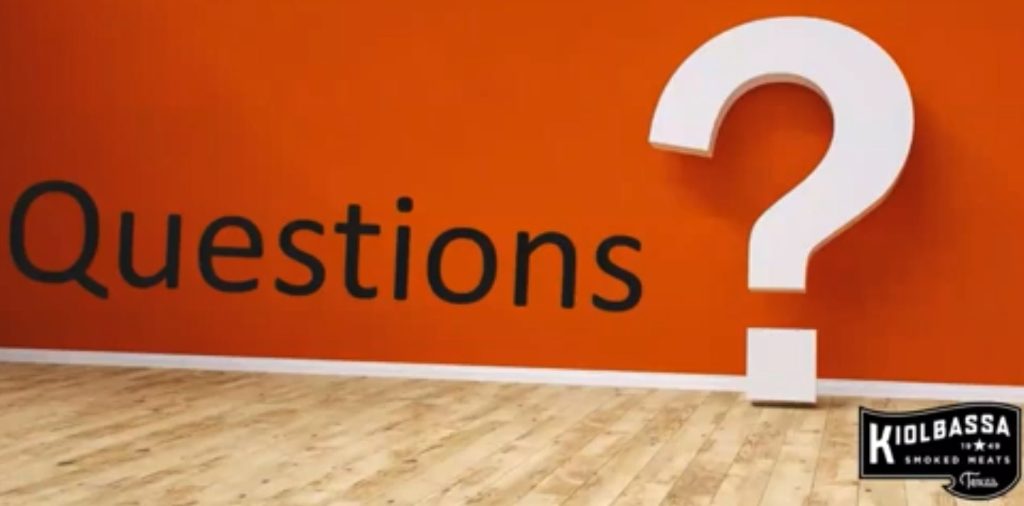
Michael:
Oh! Well, there’s a young man I think I know! [laughter]
Todd:
He doesn’t meet all those criteria that he rattled off. [laughter]
Michael:
Rowe is a wonderful graduate of the Cox School of Business.
Rowe:
Yes, it is a great institution. High on the hilltop. Yes sir.
Todd:
Absolutely we’re proud of that.
Rowe:
We have a question in the Q&A. Michael, do you find that when you grow the business to a higher level it gets harder to find business consultants that can help?
Michael:
What a great question! It is interesting, we are going through a process right now that we call organizational alignment. We’ve grown so much and we do plan to take the company to the next level. We are identifying our business pillars and trying to align our processes. This is pretty complicated so we are bringing in somebody from the outside.
But to answer the question, the first place that I go when I look for a consultant is Guy Clumpner, at Holt Development Services (HDI), because I want someone that understands a Values-Based culture. So many consultants don’t get that. If they don’t get that, then their advice is going to be worth nothing to us.
Over strategy is an umbrella of culture. Then it is:
- Strategy
- Structure
- Process
- People
- Resources
Those are tied together. If we don’t have someone that’s culturally aligned it’s just like going back to the question we have with our customers and vendors: are they aligned with our values? If you’re not aligned with our values, then it’s going to be very challenging for us to be productive. That is a great question. But that’s how we deal with it.
Rowe:
Awesome, thank you.
We have one more question. Of all of your accomplishments with Kiolbassa Smoked Meats, what is the one thing that you would say is your greatest accomplishment?
Michael:
Easy. Being named the top workplace. To me, to have a workplace that’s recognized at that elite level gives me more pleasure than anything else. To walk the floor and to see smiling faces on our team members, to see the positive engagement. I can’t tell you how many times we have had customers walk through our plant say, “I’ve never seen the engagement from the floor personnel that we see at your plant.” It is super exciting and fuels a lot of energy.
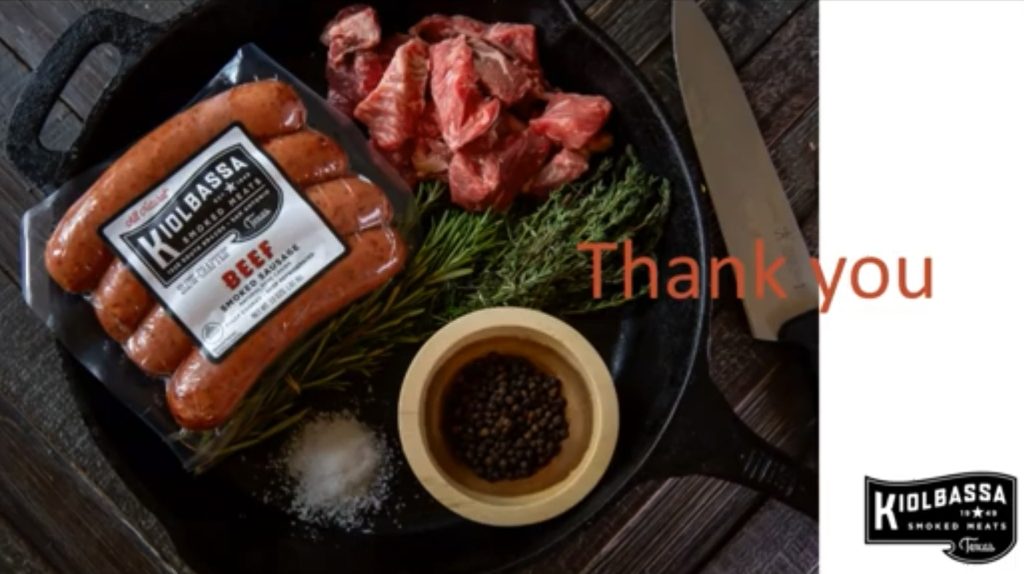
Todd:
That’s a great way to wrap it up, clearly your team is important to you.
I want to make a quick personal note. You referenced how important it was when you turned it over to God. My family and I have been through two or three different things. One time we went through and prayed, “God bless what we have done.” Meaning, please bless what we’ve already done. And it didn’t work. The second time we prayed, “God show us what you would have us do.” It made all the difference in the world.
Michael:
Yes!
Todd:
Thank you so much for your sharing and testimony. This has been a wonderful reinforcement for those of us who have had the pleasure of hearing you before.
Remember, we have recorded this talk and it will be available on our website. Michael, there will be a link back to your website.
Thank you again to everybody on the call and particularly to you, Michael, for sharing with us today. Safe travels back home.
Michael:
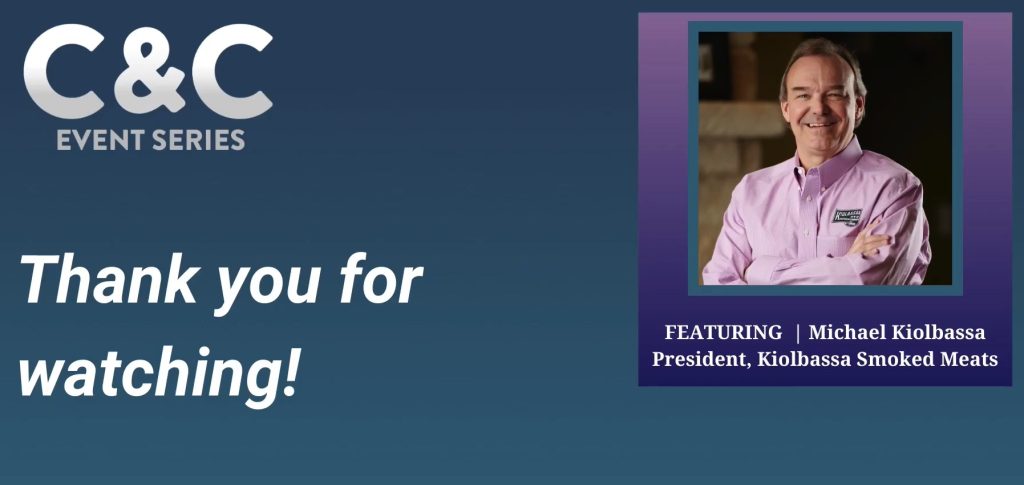
About Michael Kiolbassa
Michael is a native San Antonian and began his career in the family sausage business in 1987 after a two-year period working in the commercial banking industry as a credit analyst. Since then, he has overseen the transformation of the family meat company from a small family business to one of the fastest-growing meat brands in the US with national distribution of their sausage, chorizo, and dry-cured bacon. He was named one of San Antonio’s “40 under 40” rising business stars, the 2004 Small Businessperson of the Year by the Small Business Administration, and a 2016 and 2020 finalist for Ernst & Young’s Entrepreneur of the Year award. In 2020, his company, Kiolbassa Smoked Meats was named by Forbes Magazine as one of the 25 “Small Giants” in business.
 ™
™
